What is SOLAR PRINT?
It is a magic trick printing technique that uses ink that develops full color when exposed to sunlight. The coloring is repeated while being exposed or not exposed to sunlight (ultraviolet rays), which is the energy of nature. The color develops slowly and disappears slowly.
*The coloring repeats and disappears even when exposed to a UV light.

①About Triggers
The trigger for the coloring of the solar print's hidden design is "sunlight or UV light's ultraviolet rays".


②Technical Overview | Product Specifications
This printing technology uses photochromic dyes, reversible inks capable of producing the four primary colors (CMYK) cyan, magenta, yellow, and black, and uses excitation light around 365 nm, which is the near ultraviolet ray contained in sunlight, to produce strong colors. The color can be used repeatedly as it returns to its original state when the UV light is blocked even if it has been colored once.

*The photo shows oil-based ink.
| Solar Print Product Specifications | |
| Ink | Oil-based ink for outdoor use. |
| Paper | Interior paper. |
| About photochromic (principle of chromic) | |
 |
 |
| ・Photochromic dyes are synthetic dyes in the form of crystalline powders. | |
| ・The dye dissolves in an organic solvent to produce a colorless to colored reversible effect. The effect cannot be achieved unless the dye is alone or dissolved. | |
| ・Regarding color return, since the dissolved dye forms a matrix with the substrate, the speed of color development to color disappearance is greatly affected by the substrate. | |
③Notes on installation and use
Time required for color generation and color disappearance
SOLAR PRINT is colored slowly by exposure to ultraviolet rays for a few seconds, and gradually return to their original state in a few dozen seconds when the ultraviolet rays are cut off. Please note that if the UV light is continuously irradiated, it will take longer for the color to return to its original state, and if the same spot is continuously irradiated at a close distance for several minutes, the time required for the color to return to its original state will be extremely long.
| Verification of the time required to return to the state before irradiation when the same spot is continuously irradiated with UV light at a distance of 50 cm for several minutes. | |||
| *Colors in a few seconds, so generally does not irradiate continuously for more than a few seconds. | |||
| Continuous irradiation time | If the same spot is irradiated continuously for 1 minute | If the same spot is irradiated continuously for 3 minute | If the same spot is irradiated continuously for 5 minute |
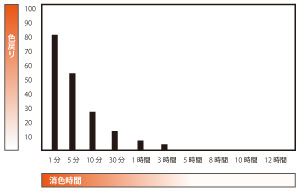 |
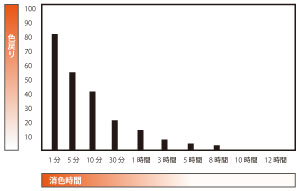 |
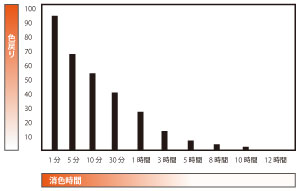 |
|
| Time to fade | It will return to its original state in about 5 hours. | It will return to its original state in about 10 hours. | It will return to its original state in about 12 hours. |
| Verification of the time required to return to the state before irradiation when the same spot is continuously irradiated with UV light at a distance of 10 cm for several minutes. | |||
| *Colors in a few seconds, so generally does not irradiate continuously for more than a few seconds. | |||
| Continuous irradiation time | If the same spot is irradiated continuously for 1 minute | If the same spot is irradiated continuously for 3 minute | If the same spot is irradiated continuously for 5 minute |
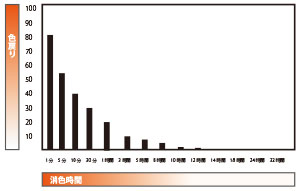 |
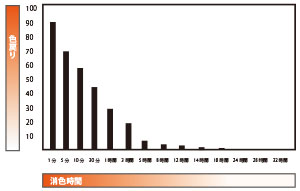 |
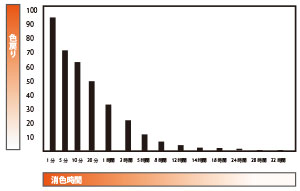 |
|
| Time to fade | It will return to its original state in about 14 hours. | It will return to its original state in about 24 hours. | Slight traces of ink remain even after 120 hours. |
| Time to return to the state before irradiation in the case of verification by repeatedly irradiating the same spot with ultraviolet light from a distance of 10 cm for several tens of seconds and then turning off the light for 3 minutes. | ||
| *Colors in a few seconds, so generally does not irradiate continuously for more than a few seconds. | ||
| Continuous irradiation time | If the same spot is continuously irradiated for 30 seconds and then the light is turned off for 3 minutes, repeated 5 times | If the same spot is continuously irradiated for 1 minutes and then the light is turned off for 3 minutes, repeated 5 times |
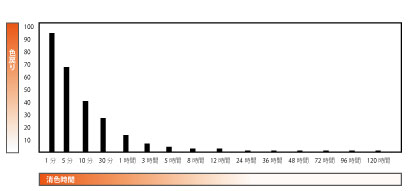 |
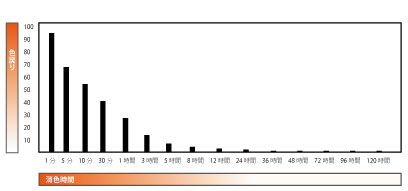 |
|
| Time to fade | Slight traces of ink remain even after 120 hours. | Slight traces of ink remain even after 120 hours. |
| Verification conditions | ||||
| UV Light | Ink | Paper | When irradiated with ultraviolet rays | After blocking ultraviolet rays |
 UV-LED 365nm |
Solvent Solar Ink | Synthetic paper (matte laminated) |
 |
 |
UV irradiation frequency and fading
After about 5760 UV irradiations, the density of the SOLAR PRINT was halved from the original coloring density.
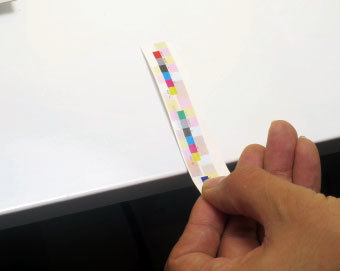
Figure 1: (5-second irradiation)

Figure 2: (55-second shutdown)

Figure 3 (55-second shutdown)
| Verification conditions | Number of times until color density is reduced by half | |
| UV irradiation for 5 seconds | 60 seconds 1 cool | Approx. 5760 times |
| Blocks UV rays for 55 seconds | ||
| Verification conditions | |||
| Lighting | Ink | Paper | Irradiation distance |
| Artificial sun | Solvent Solar Ink | Synthetic paper | 84cm |
| *Verified assuming 12:00 noon in midsummer. | |||
Outdoor Installation
When installed outdoors during the day, the hidden design is always visible in response to the ultraviolet rays of the sun, making it difficult to enjoy the before-and-after changes in the design. Also, continuous exposure to strong ultraviolet rays such as sunlight will accelerate fading.
| Verification conditions | Number of times until color density is reduced by half |
| Continuous ultraviolet irradiation | Approx. 4-5 hours |
| Verification conditions | |||
| Lighting | Ink | Paper | Irradiation distance |
| Artificial sun | Solvent Solar Ink | Synthetic paper | 84cm |
| *Verified assuming 12:00 noon in midsummer. | |||
Environment for maximum SOLAR PRINT effectiveness
When using a UV handy light for indoor exhibits, etc., you can enjoy maximum solar print colors without any particular concern. When using ultraviolet rays from the sun, such as for handouts, there are certain times of the day, climate, and seasons with high ultraviolet light levels that are optimal for solar printing.


Differences in ultraviolet radiation levels at different times of the day
○ is the recommended time of day to enjoy the coloration of solar prints due to the ultraviolet rays of sunlight. The maximum coloration can be enjoyed between 11:00 and 12:00, when the UV rays are strongest. In addition, during the hours marked with ✖, the coloring density is 10-30% lower than during the hours marked with ○.
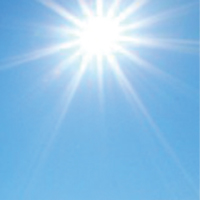 |
 |
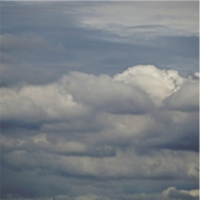 |
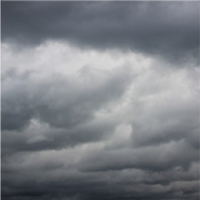 |
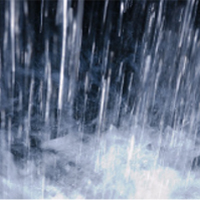 |
| good weather | fine | slightly cloudy | cloudiness | rain |
| 100% | 98%-90% | About 80% | About 60% | About 30% |
Differences in ultraviolet radiation levels due to climate
This is the amount of ultraviolet rays when the ultraviolet rays during clear skies are set at 100%.

Monthly differences in UV radiation levels
Ultraviolet radiation levels are highest in summer.
When coloring indoors with ultraviolet rays of sunlight
When enjoying the coloration of solar prints indoors under ultraviolet rays from sunlight, the UV transmittance of the glass may affect the original coloration effect. UV-cut glass or glass windows with thermal barrier performance will cut ultraviolet rays and weaken the coloring effect.

